Group at All Saints Parish imitates the example of St. Tabitha to help women around the world
By Gabrielle Nolan
Here in the West, it is called “period poverty.” When girls and young women do not have the resources to care for their monthly menstrual cycles, they are forced to stay home and miss valuable time at school or work.
It was in January 2019 that neighbors Jeanette Fanfarillo and Sadiatou Jallow discussed the hygiene troubles that females worldwide experience while on their menstrual cycles. It was a conversation that, unbeknownst to them, would propel them into ministry.
Mrs. Fanfarillo saw an unusual cloth item on Ms. Jallow’s coffee table in her living room. When she asked what it was, Ms. Jallow explained that it was a reusable sanitary pad and began to explain the plight of women and girls in her home country of Gambia in West Africa.
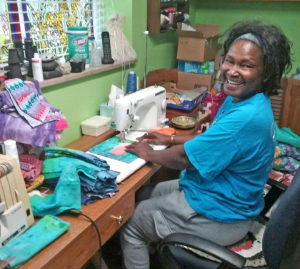
Sadiatou Jallow at her home sews a reusable sanitary pad, which was the item that sparked the conversation between her and her friend Jeanette Fanfarillo that led to the St. Tabitha ministry.
“I said we’re trying to help people in Africa, girls going to school, to be able to afford sanitary pads,” Ms. Jallow recounted. “Because it is not either available where they live or if they live in the city, it is expensive; they cannot afford it.”
Ms. Jallow said that she was fortunate while growing up to not face some of the issues that other girls and women did.
“People that I’ve been with in the same schools . . . and people that I’ve been with in the same job, they’ve been the people that inspired me. . . . I never forget them,” she said.
“I’ve been thinking about those moments when they are not in school because of [their periods]. Those moments when they cannot be at work because of that. Those moments when they cannot pay their bills because they cannot be at work. I think about those moments.”
Ms. Jallow shared the sad reality that many African women have these obstacles, preventing them from regularly attending school. This inhibits higher-education opportunities to pursue specialized careers such as law or medicine.
“So, instead they stay at home, until they finish (their period), for a whole week before they could go back. So that sets them back with their education and, you know, with their level of jobs. It sets them back in different areas,” she said.
For Mrs. Fanfarillo, her eyes were opened to these unfortunate circumstances, and her heart was opened to a new mission.
‘A lot of research’
“I had a hard time sleeping thinking about what she said,” Mrs. Fanfarillo said. “I asked her if I could borrow this item on her table, and I went home, and I started playing with it a little bit, and I kind of looked at it. We spent the next several months going back and forth making changes and adaptations to what we finally came up with for us.”
Mrs. Fanfarillo would take examples of what she was sewing to her women’s group at All Saints Parish in Knoxville.
The reusable cloth pads are made to last for about three years with intentional design features: extra padding for absorption, a waterproof polyurethane laminate on the back for protecting clothing, and snap closures to ensure pads stay in place throughout the day.
“It isn’t totally foolproof, but it gives you more protection. We put a lot of research into what we do,” explained Mrs. Fanfarillo.
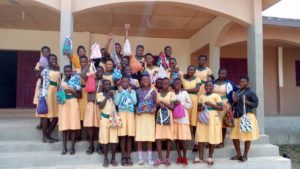
A group of girls at a Catholic middle school in Ghana hold up their newly received hygiene kits from the St. Tabitha ministry at All Saints Parish in Knoxville.
Because women in African villages do not have electric washers and dryers, these reusable pads were designed to be hand-washed with soap and clean water, then hung on a clothesline to dry in the heat of the sun.
The fabric pads are less expensive than purchasing new disposable items each month and are more practical for remote towns or villages that don’t have regulated waste disposal.
Additionally, they are also an alternative for women who may be allergic or sensitive to certain plastic and paper products on the market.
One hygiene kit contains a cloth bag, eight reusable pads, two pad holders, and women’s underwear.
Susan Tribble, the head of women’s ministries at All Saints, was intrigued by the endeavor and invited Mrs. Fanfarillo and her husband to speak with Father John Appiah, who previously served as associate pastor at All Saints before becoming a military chaplain in 2013.
At that time, Father Appiah ministered at a medical clinic and a Catholic middle school in his home country of Ghana, where many girls need hygiene kits in order to attend school regularly.
“Father John was the first one that we sent [the kits] out to…. We had 50 kits for him,” Mrs. Fanfarillo said.
Almost three months later, Father Appiah sent pictures of the girls joyfully holding their kits in front of the school.
“The women were just so excited… The energy, seeing [Father’s] girls get them, just moved the women more forward,” Mrs. Fanfarillo said.
A ministry is born
When Mrs. Fanfarillo realized that her blossoming group may need an official name, she began to research the various patron saints of sewing.
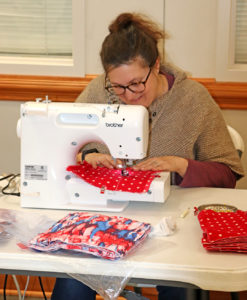
Mollie Bault uses her own sewing machine in the All Saints parish hall to make reusable fabric sanitary pads.
“Tabitha kind of stuck in my head, and I started looking up what she was about, and she was a remarkable woman,” Mrs. Fanfarillo said. “She was a widow, and she kept sewing for other widows and for children and for people who couldn’t do it on their own.”
St. Tabitha is mentioned in Scripture in the Acts of the Apostles.
“She was around when Jesus was, when he walked the earth,” Mrs. Fanfarillo continued. “When she died, these women cried. . . . They went to St. Peter, and he brought her back (to life). . . . They were showing him all the stuff she made for them, and he brought her back. She lived the Gospel, and that’s what we try to do.”
St. Tabitha’s Sewing Circle held an informational meeting for women at the parish to see the personal hygiene kits, and participants were asked to bring donations of sanitary items that would benefit high schools in Knox County for a one-time kickoff project.
“We’ve had women bring tampons and pads for the high-school girls in Knox County to stock the teacher supply workroom, because we found out in doing research that right here in our own city there are girls who do not go to school because on the day they’re having their periods, they have no supplies. They can’t afford to buy them, so they stay home,” Mrs. Tribble said. “We had hundreds of boxes; it was very successful.”
“We collected supplies for our local high-schoolers, as well as getting the awareness out for women who might want to sew, who might want to help pack things, who might want to help Jeanette with the program,” she said.
Mrs. Tribble then planned a “Girls Night Out” event for July 2019, open to all women in the parish.
Almost 300 women arrived with donations of underwear and sanitary items, and the parish center was filled with tables adorned with the personal hygiene kits for the women to look at.
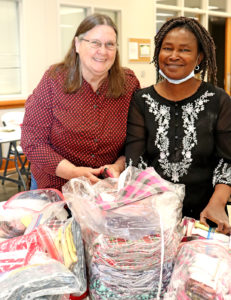
Jeanette Fanfarillo and Sadiatou Jallow meet at All Saints Church to sort and count fabric for the hygiene kits.
Ms. Jallow was invited to be the guest speaker for the evening’s program and took the stage wearing her traditional African dress and headscarf. She showed the women how her headscarf could be used to wrap around her body for protection during a menstrual cycle.
“I was so honored to be there,” Ms. Jallow said.
She demonstrated how women in Africa might find a piece of cloth alongside the road, then go home to wash it and use it in place of a sanitary pad, “which might be uncomfortable and unsanitary, that you can get an infection through that, anything could happen,” she said.
“By the time that gathering ended, people were coming up to Sadia and I putting money in our hands, putting money in our pockets, asking how they could donate, how they could join, and that’s how all that started,” Mrs. Fanfarillo said. “She made a big impression on people.”
Mrs. Tribble said that “every woman alive can relate to the need of having personal-care items every single month of her adult life.”
“This is not a male issue, it’s a woman’s issue,” she said. “How expensive it is, how you can’t go anywhere unless it’s dealt with, how it does affect being able to go to school, being able to go to work. I think it touches every woman’s heart.”
Women serving women
In addition to the fundraiser, the St. Tabitha Sewing Circle also has received funding from the parish’s Harvest of Blessings annual festival, where various ministries set up booths highlighting their mission and selling goods. The ministry’s table sold homemade teddy bears and shopping bags while displaying posters of its story and the girls it serves.
The hygiene kits are always free of charge, making donations of either fabric or money essential for the ministry to continue.
According to Mrs. Tribble, the St. Tabitha Sewing Circle has received almost $6,000 in donations since the ministry began.
“Nobody’s charged for a bag; they can get the bag just by asking,” Mrs. Fanfarillo explained. “We’ve been trying to connect with people who are doing mission trips. If you don’t have somebody who’s going to that school or that place or that church for them to pass it out, the government will charge those kids for it.”
Most of the donated funds go toward overseas shipping costs. Internationally, the handmade kits have traveled to Gambia, Ghana, Kenya, Nigeria, and Liberia.
“If you’re [shipping] to Africa, two years ago it was going to cost $1,400 to send our box. We’re talking a lot of money,” Mrs. Tribble said. “We’re trying to find people who actually work in ministries to take these things. That helps us get around the shipping costs.”
However, St. Tabitha’s Sewing Circle is as much of a local ministry as it is an international ministry.
When shipping overseas during the coronavirus pandemic wasn’t possible, the curated kits went out in the local community. Organizations such as Catholic Charities of East Tennessee, St. Vincent de Paul, the Ladies of Charity, and the St. Mary’s Legacy Clinic all received hygiene kits for distribution.
A 2018 article from the Nashville Tennessean newspaper reported that one out of five girls in the United States miss school due to “period poverty.”
“We serve women in the USA who have allergies to the paper products on the market or who have limited funds or access to stores,” Mrs. Fanfarillo explained.
The hand-sewn kits have been distributed in Tennessee, Virginia, Indiana, and New York.
“This is a blessing,” Ms. Jallow said. “It’s not one-sided, it’s not only one place that we stick to. Our aim is to help as many people as we could.”
“I’ve never seen women this dedicated,” she added. “The women are determined, and they are just ready to make things happen, to make things possible.”
‘Make a difference’
The sewing group meets on the first Wednesday of every month. On a regular basis, about 15 women are actively supporting the ministry.
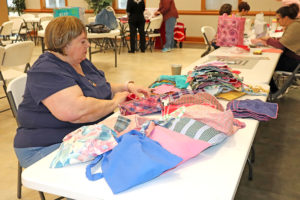
Karen Miller assembles completed hygiene kits. One hygiene kit contains a cloth bag, eight reusable pads, two pad holders, and women’s underwear.
A row of tables lines the back of the parish hall, where women diligently work their sewing machines, cut fabric, and assist one another with any snags along the way, while other women assemble the completed kits.
While sewing, the women connect with each other about their faith, sharing their current favorite podcasts, books, and speakers.
“Working with these women is just amazing. You’ve never met such a neat bunch of ladies who are so inspired and who make you be the best of yourself,” Mrs. Fanfarillo said. “One of the things I wrote to them back in January was, ‘You are the most remarkable women I have the privilege to sew with. It’s hard to believe that our lives are changing from something so simple as just our sewing.’”
The group is open to new members, for anyone who wants to help. Mrs. Fanfarillo recommends coming to one of the monthly meetings to learn more about kit-making.
“Usually, one of the girls will sit down with somebody and do a little one-on-one to show them. It’s not a real difficult process,” she said.
Of course, prayer also is an important way to be involved with the ministry.
“We have girls . . . who can’t come to our meetings, and that’s all they do, is pray for us. And I encourage my girls to pray while they’re sewing . . . either at the start or all the way through it, for the girls that’ll be receiving [the kits],” Mrs. Fanfarillo said.
Even if you don’t know how to sew, there are ways to be involved.
“You may not have a sewing machine, you may not be able to sew anything, but you can help us with the shipping cost . . . or you can buy a package of panties with this kit that they put together,” Mrs. Tribble said.
“It’s every woman everywhere that could make a difference,” she noted.
Although more help is needed and welcomed, Mrs. Fanfarillo and Ms. Jallow are amazed at how far they have come from their initial conversation over one reusable sanitary pad.
“This is even a shocking thing for us to notice ourselves, all the way to this extreme,” Ms. Jallow said. “We didn’t think it would be this noticeable or this big. We are just doing it for the sake of God, not to be noticed. I hope God blesses all of us for doing this remarkable job.”
“I’m a very quiet, shy, out-of-the-way kind of person,” Mrs. Fanfarillo said. “This has changed me somewhat.”
“I think I have really seen what the Holy Spirit does in watching Jeanette,” Mrs. Tribble said. “She is a very visible example of taking your energy and your spirit and your enthusiasm from your faith, because this changed her life. She is an outgoing, enthusiastic, passionate advocate for this program, from a basically very quiet nature.”
Mrs. Fanfarillo said she often asks for the intercession of the Blessed Mother and St. Tabitha for the work that her group of women undergoes each month.
“This is a story about many women helping women, just as St. Tabitha did at the time Jesus walked this earth,” Mrs. Fanfarillo said. “Hopefully, it will be a little better because we walked it, too.”
For more information on how to volunteer or donate, contact Jeanette Fanfarillo at farill5@tds.net.

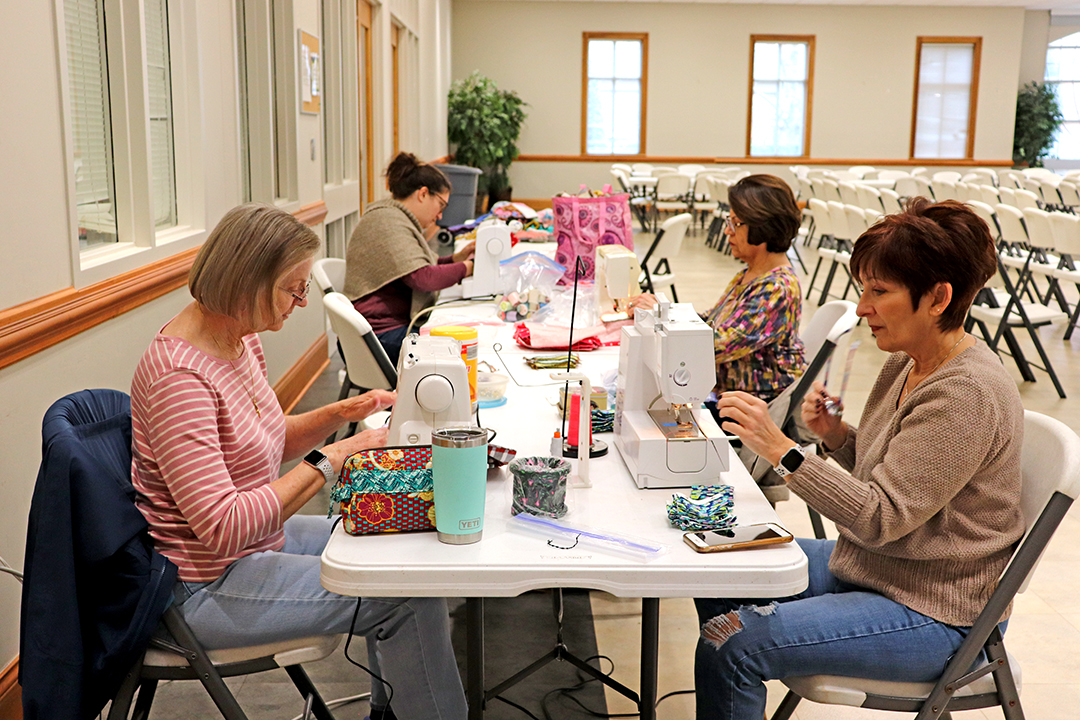
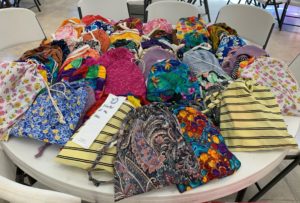
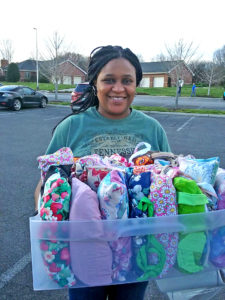
Comments 4
We are going to Mwanza Tanzania June 24 -July 5. We will have the opportunity to meet with young women. I have an email out to a few ministries that do this. Could you let me know what your criterias or how your ministry works.
Could I purchase a hygiene kit for myself? I live in MA
Please contact me regarding your ministry
Please contact Jeanette Fanfarillo at farill5@tds.net.